Dental Implant
What is dental Implant
A dental implant is a medical device that is surgically placed into the jawbone to replace a missing tooth or teeth. It is typically made of titanium or other materials that are biocompatible with the body, which means that they are not likely to be rejected by the immune system.
The dental bridge consists of three main parts: the implant itself, which is the artificial root that is implanted into the jawbone; the abutment, which is the connector that attaches to the implant and supports the replacement tooth or teeth; and the crown, which is the visible part of the tooth that is attached to the abutment.
Dental implants are a popular option for people who have lost one or more teeth due to injury, decay, or other reasons. They are considered a long-term solution to tooth loss and can help to improve the appearance of your smile, as well as your ability to chew and speak.
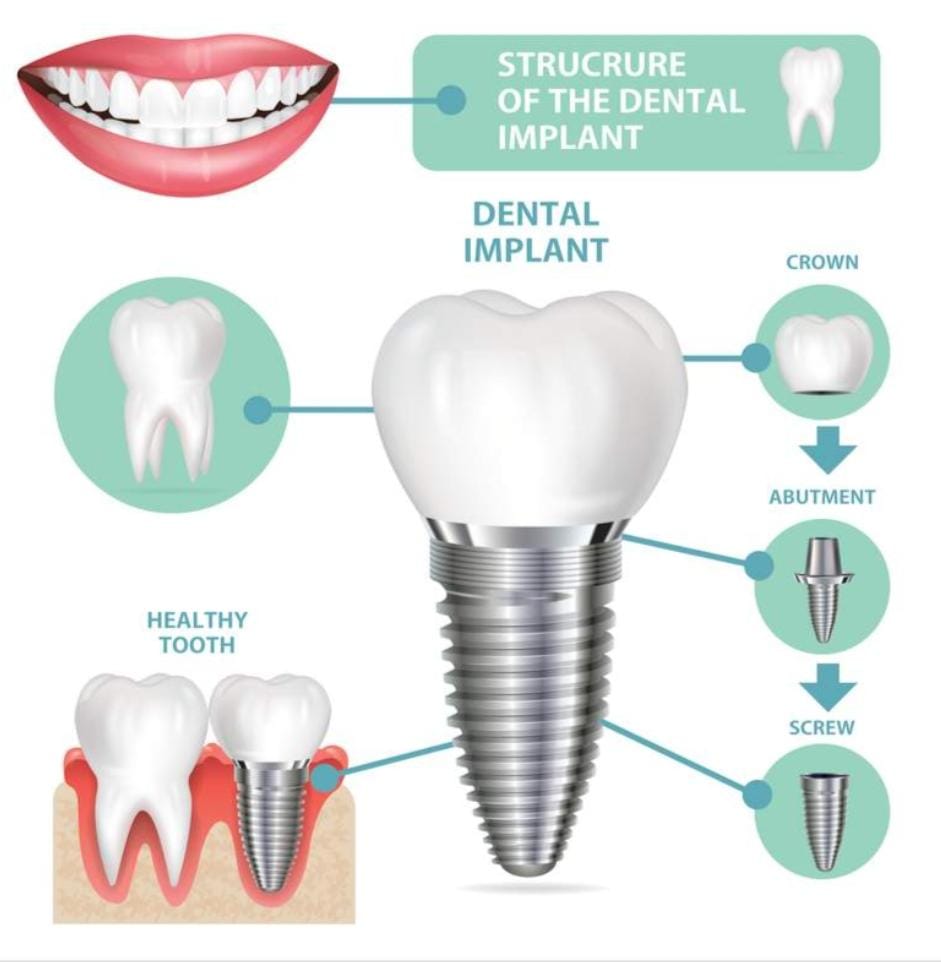
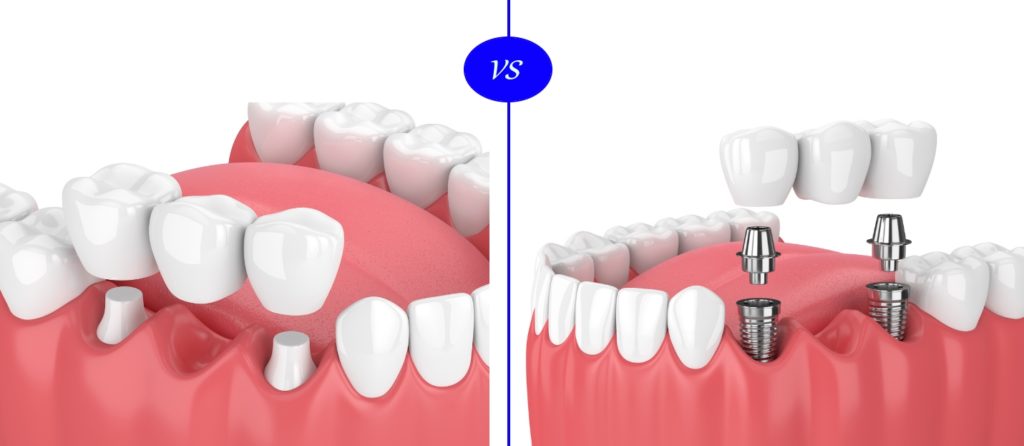
What is the success of implant as compared to dental bridge
The success rate of dental implants is generally considered to be higher than that of dental bridges. According to studies, dental implants have a success rate of 95% or higher, while dental bridges have a success rate of around 85-90%.
Dental implants are designed to fuse with the jawbone, which creates a stable and durable foundation for the replacement tooth or teeth. This process, known as osseointegration, helps to prevent bone loss in the jaw and provides a more natural look and feel than dental bridges.
Dental bridges, on the other hand, rely on the surrounding teeth for support. This means that the adjacent teeth need to be prepared and reduced in size to accommodate the bridge. This can weaken the natural teeth and make them more susceptible to decay and other dental problems.
While dental bridges may be a good option for some patients, dental implants are generally considered to be a more long-term and reliable solution for replacing missing teeth. However, the suitability of either treatment will depend on the individual case, and it is best to consult with a dentist to determine which option is best for you.
What is the procedure of dental implant
The dental implant procedure typically involves several stages and can take several months to complete. Here is a general overview of the steps involved in the dental implant process:
Consultation: The first step is a consultation with a dental implant specialist, who will evaluate your oral health and determine whether you are a good candidate for dental implants. This may involve taking X-rays and other images of your teeth and jaw.
Implant placement: The next step is the placement of the dental implant. This is a surgical procedure that involves making a small incision in the gum tissue and drilling a hole into the jawbone. The implant is then inserted into the hole and the gum tissue is sutured closed.
Osseointegration: After the implant is placed, a process called osseointegration occurs, in which the implant fuses with the surrounding jawbone. This process can take several months to complete.
Abutment placement: Once osseointegration is complete, a small connector called an abutment is attached to the implant. This is done through a minor surgical procedure in which the gum tissue is reopened to expose the implant and the abutment is attached.
Crown placement: The final step is the placement of the replacement tooth or teeth, which are typically in the form of a crown. This is done by attaching the crown to the abutment, creating a natural-looking replacement tooth.
Throughout the process, your dental implant specialist will provide instructions on how to care for your implant and monitor your progress to ensure that it is healing properly.
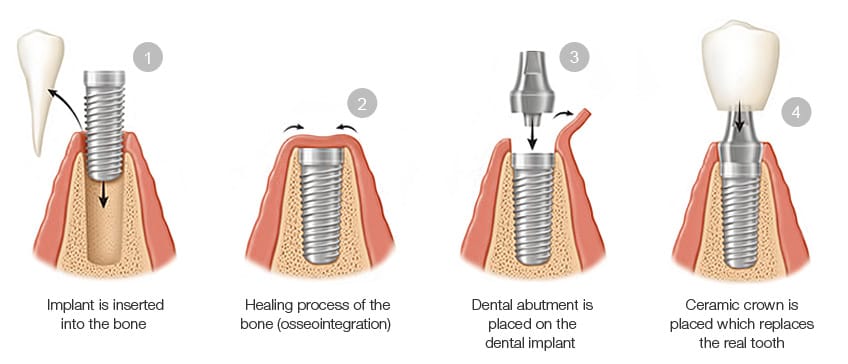
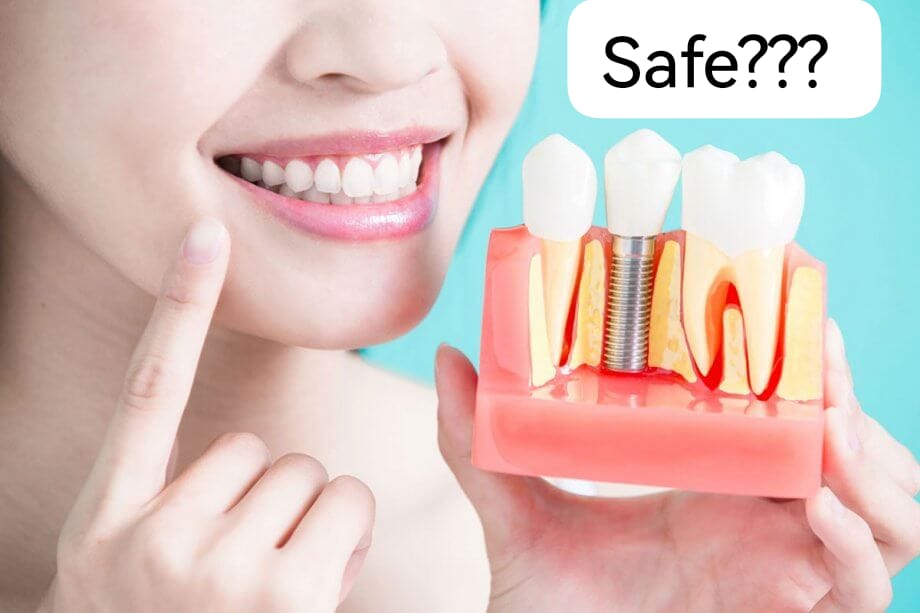
Are dental implants safe
Yes, dental implants are generally considered to be safe and have a high success rate. Dental implants have been used for many years and are a well-established treatment option for tooth replacement.
However, as with any surgical procedure, there are some risks involved, such as infection, damage to surrounding teeth or structures, nerve damage, and implant failure. These risks can be minimized by
choosing an experienced dental implant specialist, following proper aftercare instructions, and maintaining good oral hygiene.
It is important to note that not everyone is a suitable candidate for dental implants. Factors such as overall health, oral health, and bone density can affect the success of the procedure. A thorough consultation and evaluation by a dental implant specialist can help determine whether dental implants are a safe and appropriate treatment option for you.
Advantages of dental Implants
There are several advantages to dental implants over other tooth replacement options, such as dental bridges or dentures. Here are some of the key advantages:
Improved appearance: Dental implants look and feel like natural teeth, which can improve the appearance of your smile and boost your confidence.
Improved function: Dental implants function like natural teeth, allowing you to chew and speak more easily and comfortably.
Long-lasting: With proper care, dental implants can last a lifetime, making them a more cost-effective solution over the long term.
Prevents bone loss: Dental implants stimulate the jawbone, preventing bone loss and preserving the natural structure of your face.
No damage to surrounding teeth: Dental implants do not require the preparation or alteration of adjacent teeth, unlike dental bridges, which can weaken neighboring teeth.
Easy to care for: Dental implants require the same care as natural teeth, including regular brushing, flossing, and dental checkups.
Overall, dental implants are a reliable and long-lasting tooth replacement option that can improve your oral health and overall quality of life.
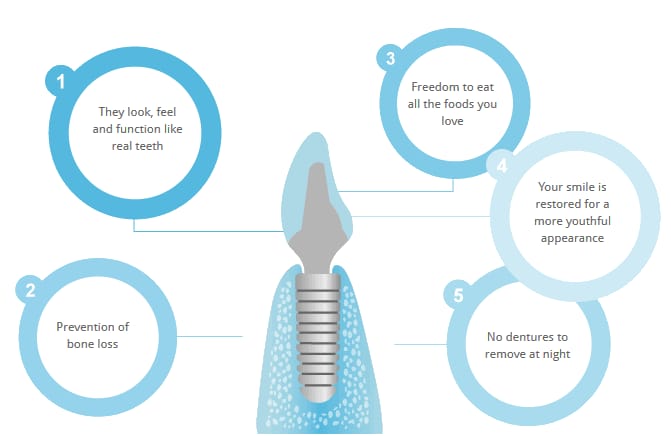

Disadvantages of dental Implant
While dental implants have many advantages, there are also some potential disadvantages that should be considered. Here are some of the main disadvantages:
Cost: Dental implants can be more expensive than other tooth replacement options, such as dentures or bridges. However, they are often considered a more cost-effective option in the long term due to their durability and longevity.
Time-consuming: The dental implant process can be lengthy, often taking several months from start to finish. This can be inconvenient for some patients who are looking for a quicker solution.
Surgical procedure: Dental implant placement involves a surgical procedure, which can be intimidating for some patients. However, most patients report minimal pain or discomfort during and after the procedure.
Possible complications: Like any surgical procedure, there is a risk of complications with dental implants, such as infection, implant failure, and nerve damage. However, these risks are relatively rare and can be minimized with proper care and attention.
Requires good oral hygiene: Dental implants require the same level of care as natural teeth, including regular brushing, flossing, and dental checkups. Patients who do not maintain good oral hygiene may be at risk of developing complications such as gum disease or implant failure.
Overall, while dental implants have some potential disadvantages, they are still considered to be a safe and effective tooth replacement option for many patients. It is important to discuss the pros and cons of dental implants with your dentist or dental implant specialist to determine whether they are a suitable treatment option for you.
Will i be able to chew from the dental implant
Yes, you should be able to chew and eat normally with a dental implant once it has fully healed and the replacement tooth or teeth have been attached. Dental implants are designed to function like natural teeth and are typically very durable and stable.
In fact, many patients report that dental implants feel and function just like their natural teeth. This can be a significant improvement over other tooth replacement options, such as dentures or bridges, which can be less stable and make it more difficult to chew certain foods.
However, it is important to note that during the initial healing period, you may need to eat soft or liquid foods and avoid putting too much pressure on the implant site. Contact us your dental implant specialist will provide specific instructions on how to care for your implant during the healing process, and will advise you on when it is safe to resume your normal diet.



